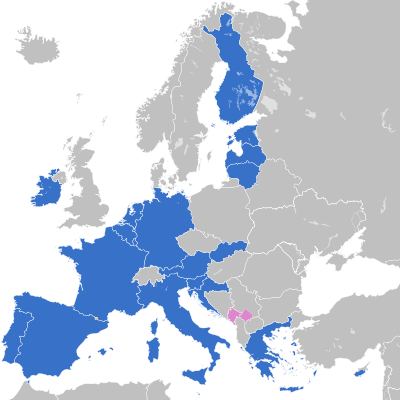
Eurozone
Area in which the euro is the official currency / From Wikipedia, the free encyclopedia
Dear Wikiwand AI, let's keep it short by simply answering these key questions:
Can you list the top facts and stats about Eurozone?
Summarize this article for a 10 years old
The euro area,[8] commonly called the eurozone (EZ), is a currency union of 20 member states of the European Union (EU) that have adopted the euro (€) as their primary currency and sole legal tender, and have thus fully implemented EMU policies.
| Policy of | European Union |
|---|---|
| Type | Monetary union |
| Currency | Euro |
| Established | 1 January 1999 |
| Members | |
| Governance | |
| Monetary authority | Eurosystem |
| Political oversight | Eurogroup |
| Statistics | |
| Area | 2,801,552 km2 (1,081,685 sq mi)[1] |
| Population | 349,256,040 (January 2023)[2] |
| Density | 125/km2 (323.7/sq mi) |
| GDP (nominal) | €13.4 trillion €38,470 (per capita) (2022)[3] |
| Interest rate | 3.50%[4] |
| Inflation | 5.5% (June 2023)[5] |
| Unemployment | 6.5% (April 2023)[6] |
| Trade balance | €310 billion trade surplus[7] |
The 20 eurozone members are:
- Austria, Belgium, Croatia, Cyprus, Estonia, Finland, France, Germany, Greece, Ireland, Italy, Latvia, Lithuania, Luxembourg, Malta, the Netherlands, Portugal, Slovakia, Slovenia, and Spain.
The seven non-eurozone members of the EU are Bulgaria, the Czech Republic, Denmark, Hungary, Poland, Romania, and Sweden. They continue to use their own national currencies, although all but Denmark are obliged to join once they meet the euro convergence criteria.[9] Among non-EU member states, Andorra, Monaco, San Marino, and Vatican City have formal agreements with the EU to use the euro as their official currency and issue their own coins.[10][11][12]
In addition, Kosovo and Montenegro have adopted the euro unilaterally.[13] These six countries, however, have no representation in any eurozone institution.[14]
The Eurosystem is the monetary authority of the eurozone, the Eurogroup is an informal body of finance ministers that makes fiscal policy for the currency union, and the European System of Central Banks is responsible for fiscal and monetary cooperation between eurozone and non-eurozone EU members. The European Central Bank (ECB) makes monetary policy for the eurozone, sets its base interest rate, and issues euro banknotes and coins.
Since the financial crisis of 2007–2008, the eurozone has established and used provisions for granting emergency loans to member states in return for enacting economic reforms.[citation needed] The eurozone has also enacted some limited fiscal integration; for example, in peer review of each other's national budgets. The issue is political and in a state of flux in terms of what further provisions will be agreed for eurozone change. No eurozone member state has left, and there are no provisions to do so or to be expelled.[15]





